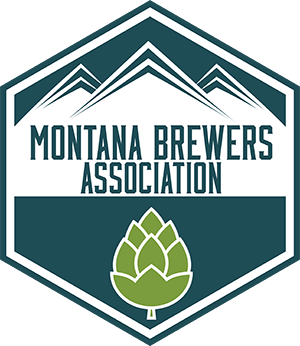

Want to walk into a brewery after 8:00 pm and be able to buy a pint? Well, your wish has been granted, at least at some of Montana’s local breweries.
Back in April, the Montana State Legislature passed a bill that allows brewers to own a retail license, enabling Montana breweries that hold such a license to stay open later and not be subject to the 48 oz (or three pint) limit. Its passage marked a huge leap forward in the long journey to achieve greater retail opportunities for Montana craft brewers.
HB 305, sponsored by Rep. Ed Buttrey (R-Great Falls) went into effect on July 1, and brewers are already making moves to capitalize on this new opportunity. The very first brewery to buy a retail beer and wine license was Beehive Basin Brewery in Big Sky.
Beehive is currently going through the inspection and approval process. They expect to be able to start utilizing their new license soon and are planning to stay open until 10:00 pm. Owner Andy Liedberg is excited to have beers on tap from other breweries and offer their customers a greater variety. He also foresees Beehive utilizing a catering endorsement with their new license to be able serve at community events.
“The nice part of being a brewery is that you have less worries about over-serving and what comes along with it. 8:00 pm last call is a bit painful but on the busiest day of the year your employees still get out of work at a decent time. We are hoping to find a balance that benefits our customers, employees and our bottom line,” says Liedberg.
Being able to get a beer at a Montana brewery past 8:00 pm has long been a goal for both Montana brewers and brewery customers. The limitations go back to the 1999 law through which Montana brewers first gained retail privileges to sell beer in their taprooms. Bar and restaurant owners, who are required to purchase a retail license in order to serve alcohol, requested that the newly granted retail privileges for breweries be limited. From their perspective, they didn’t want to see competitors able to enjoy the same retail privileges without having to buy the same license.
Until July 1, Montana brewers were prohibited by law from owning an on-premises retail license, and brewery retail privileges were actually an exception to a prohibition on brewers retailing beer directly to the public. HB 305 offers a pathway for expanded retail privileges for brewers in a way that the traditional license-holders could support. For breweries to gain additional hours and eliminate the 48 ounce limit, we would have to play by the same rules as bars and restaurants – buy a license from Montana’s quota system to enjoy full retail privileges. We call this “stacking” because breweries utilizing this option are stacking a retail license on top of their manufacturing license.
Some might be confused by the many breweries around the state that already serve beer past 8:00 pm. Around 30 breweries across Montana were already doing this before the law changed. From Tamarack Brewing in Lakeside to Meadowlark Brewing in Sidney, customers were under the impression this was already allowed. But technically, those taprooms are not actually in a brewery at all.
Taprooms that served past 8:00 pm have been operating under a retail license owned by a separate business with entirely separate ownership, premises, and finances. This is commonly referred to as a “closely held license.” Without getting into all the technical details of these complex arrangements, it is not a viable option for many breweries due to ownership structures, building ownership and floor plans. Additionally, since they are separate businesses with separate finances, profits from the taproom cannot simply be reinvested in the manufacturing operations of the brewery.
Closely held licenses offered an important yet imperfect solution, while stacking is a cleaner solution that attaches the additional retail privileges to the brewery. That means some breweries currently operating in a closely held license arrangement will transition to a stacked license, folding the two businesses together and unifying the finances. The change for the public will be subtle, often amounting to little more than a change of exterior signage, but the changes behind the scenes will be significant for the brewery.
Bridger Brewing plans to transition from a closely held license to a stacked license at their Three Forks location, which just opened last year and started hosting live music this summer. Owner David Breck explains the motivation for operating under a retail license, whether it’s stacked or closely held.
“The biggest benefit is for our guests. Especially in the summer months, with no 8:00 pm cut off, people don’t have to rush back from a day of fishing or other summer activity to get a beer and a bite,” says Breck. “We’re also better able to host events in the evening, like outdoor concerts and fundraisers without having to worry about finding a catering partner and applying for special permits.”
In the coming months we expect to see more and more brewers utilizing this opportunity from both directions – breweries newly purchasing a license and others switching from a closely held arrangement. But the change will take time as retail licenses in Montana are limited by the state’s quota system, which bases the number of licenses in an area on the population. In some places licenses may not be readily available, and even when they are available those licenses can be expensive, costing hundreds of thousands of dollars in larger communities.
Importantly, no breweries are required to purchase a retail license under the new law. The limited retail privileges attached to a manufacturing license – service from 10:00 am to 8:00 pm, close by 9:00 pm, and a limit of 48 ounces per customer – remain intact for breweries that want to continue to operate their taproom without a retail license.
Montana summers bring gloriously long days, allowing us to hike, float, bike and otherwise play well into the evening hours. These months also shine a spotlight on the 8:00 pm end of service whenever people try to grab a beer after their outdoor activities only to find out the brewery has already closed. We’ll see a few breweries take advantage of longer hours this summer, though the days are already getting shorter. But the additional hours are still helpful year-round and next summer promises to be a whole new game after breweries have had a year to utilize the extended hours opportunity offered by the new law.
Montana is a small player in hops production, responsible for just .3% of all hops production in the United States measured by acreage. Yet Montana is one of the few states seeing increased hops production, an increase that has been remarkable. Montana hops production grew more than 1,000% between 2017 and 2021, according to data presented by Hop Growers of America. With recent forecasts of an oversupply of hops, can Montana continue this positive trend?
These flowering plants are an essential beer ingredient, providing bitterness, aroma, and flavor. With Montana’s climate, fertile social, and strong agricultural traditions, the state has become an ideal place for hops farming. Montana’s hops farmers have been quick to embrace innovation and sustainable practices, contributing to the quality and reputation of the industry. As breweries across Montana seek unique and locally sourced ingredients, more are turning to Montana hops farms.
According to Crooked Yard Hops founder Jake TeSelle, because hops are not traditionally grown in Montana, the state’s hops industry is fairly new. Together, Washington, Idaho, and Oregon account for most of the country’s hop production. Big Sky Hops farm co-owner, Maddy Snipes, explains that comparing the hop industry in Montana to these other states is like comparing apples to oranges: “Most of the hop growers in Montana are small family-run farms, so we don’t have the capital to expand as much as other states, which is also why we won’t expand as quickly as others have. Although we are growing the same commodity, the industries in the states are so different.”
In February, Bart Watson, the Brewers Association’s chief economist, warned against an unstable disparity between hop supply and hop usage. Data from the National Agricultural Statistics Service (NASS), Agricultural Statistics Board, and the United States Department of Agriculture (USDA) detail that hop supply has exceeded hop usage. This is in contrast to just a few years ago, when in 2016, the Wall Street Journal reported that farmers could not produce enough hops to keep up with the demand from the growing number of American craft breweries. As a result, many farmers increased their hop production. The current oversupply of hops can be explained in part by an overcorrection to the previous hop shortage, as many hops farmers produced more hops than brewers across the country needed. To balance the supply and demand of hops, many hop farms are now decreasing their acreage.
Montana hops farms are not immune to the imbalance of supply and demand, explains TeSelle who has idled roughly 30-40% of his farm in Bozeman. “You can grow as many hops as you want, but you may not sell it” states TeSelle.
In the current market, Snipes does not foresee any Montana hop growers increasing their acreage, but is optimistic about the hops industry in the state: “It’s definitely troubling news, however, we are very fortunate to live in a state that is hyperfocused on local ingredients.”
Both TeSelle and Snipes agree that buying local is a value that many Montanans share. TeSelle explains: “The whole state has a small-town feel. Locals love supporting Montana breweries, and Montana breweries love supporting local hops farms.”
Many key factors contribute to the reason many Montana breweries choose to buy local hops and see them as a vital ingredient for their breweries. Choosing to work with local farms allows brewers to visit hops farms, talk to the farmers, see the crop, and inspect the facilities. Additionally, since Montana hops farms are generally closer to many breweries than out of state farms, brewers can get hops faster, reducing their carbon footprint and obtaining fresher hops in the process.
TeSelle estimates that 50 to 66 percent of Montana-grown hops stay in Montana, referencing the growing credibility of Montana hops farms. Snipes echoes this, stating that “For us, demand has increased year after year. We are so grateful to Montana brewers… they have really turned a corner and started to trust Montana hop growers.” As Montana’s hop industry continues to blossom, it is likely to spark stronger partnerships between brewers and farmers, supporting the local economy and reinforcing Montana’s reputation as a thriving hub for quality hops and craft beer.
Despite challenges of supply and demand nationally, the demand for locally sourced ingredients in Montana’s craft beer scene has provided a promising future for the Montana hops market. “We will stick to our Montana roots and work with each other to keep everyone successful,” concludes Snipes.
Breweries from around the state are returning to Memorial Park in Helena on Saturday, August 6th for the highly anticipated Summer Rendezvous Brewfest at Memorial Park. The Summer Rendezvous is the perfect opportunity to indulge in delicious, locally crafted beers and beat the summer heat. Plus, there’s even more to look forward to!
VIP hour kicks off from 3-4pm, giving VIP attendees an exclusive early start. General admission runs from 4-8pm, ensuring you have plenty of time to enjoy the festivities.
During general admission, you can groove to the tunes of The Timber Rattlers, an energetic bluegrass band pulling inspiration from their traditional roots. During VIP hour, West Dakota Stutter will treat attendees to a special performance.
With 24 Montana breweries participating and 88 different beers to savor, craft beer enthusiasts are in for a treat! Plus, there will be a variety of mouthwatering bites from Black Iron BBQ, Cheddars Gourmet Grilled Cheese, Highlander Taste, SOUTHPAW Street, and The Poutinerie.
Advance VIP and General Admission tickets are on sale now. But HURRY, our last brewfest sold out! Secure your tickets in advance to save $5 off the day of price. You can find more information and get tickets here.
 Looking beyond the summer excitement, mark your calendars for the Montana Brewers Fall Rendezvous on Friday, September 29th at Caras Park in Missoula. As the leaves change and the air turns crisp, Montana breweries will gather once again to showcase their beers. Just like its summer counterpart, the Fall Rendezvous will feature an incredible lineup of local breweries, each presenting their unique brews for attendees to savor.
Looking beyond the summer excitement, mark your calendars for the Montana Brewers Fall Rendezvous on Friday, September 29th at Caras Park in Missoula. As the leaves change and the air turns crisp, Montana breweries will gather once again to showcase their beers. Just like its summer counterpart, the Fall Rendezvous will feature an incredible lineup of local breweries, each presenting their unique brews for attendees to savor.
And, of course, what’s a brewfest without great music? The Fall Rendezvous will treat visitors to live performances from North Fork Crossing for VIP hour and Cactus Cut, a captivating five-piece Americana folk band for general admission.
As with any Montana Brewers Rendezvous, the Fall Rendezvous is a community-driven event celebrating the talent and passion of brewers and other local artisans. Whether you are a seasoned craft beer enthusiast, or someone looking to explore the world of MT craft beer, this event will be a great time!
Presale tickets for the Fall Rendezvous go on sale August 14th so be sure to stay tuned for limited presale code and secure your spot early to take advantage of discounted prices.
After the largest Montana Brewers Conference to date in 2022, excitement is building for what is sure to be another outstanding annual professional conference for Montana breweries and industry partners this fall.
The Montana Brewers Conference will return to the Holiday Inn Downtown in the heart of Missoula on September 27-28, 2023.
Hundreds of brewers, industry professionals and partners from across Montana and around the country will come together for two days of educational sessions, workshops, and networking opportunities.
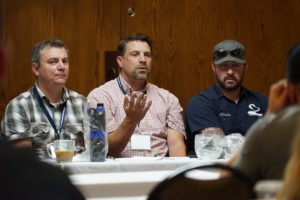 The MBA is excited to feature three different keynote speakers. On Tuesday, Sierra Nevada Brewing Co. Chief Commercial Officer, Joe Whitney, will speak to building a business with long term viability that looks to the future. Next up, Bob Quinn, organic farmer, scientist, author and founder of Kamut International from Big Sandy, Montana, will highlight our “Rooted in Montana” theme by illustrating the role agriculture plays in our communities and the beer industry. Then, on Wednesday, State Government Affairs Manager Sam DeWitt from the national Brewers Association will lay out why what happens in the statehouse is so vitally important, a timely topic on the tails of the Montana legislative session earlier this year.
The MBA is excited to feature three different keynote speakers. On Tuesday, Sierra Nevada Brewing Co. Chief Commercial Officer, Joe Whitney, will speak to building a business with long term viability that looks to the future. Next up, Bob Quinn, organic farmer, scientist, author and founder of Kamut International from Big Sandy, Montana, will highlight our “Rooted in Montana” theme by illustrating the role agriculture plays in our communities and the beer industry. Then, on Wednesday, State Government Affairs Manager Sam DeWitt from the national Brewers Association will lay out why what happens in the statehouse is so vitally important, a timely topic on the tails of the Montana legislative session earlier this year.
The conference will also feature a variety of educational sessions from the technicalities of yeast propagation or setting up a QA/QC program on a budget, to skills building for managers in HR topics like performance improvement and retention, and front of house focused content on branding and working with the media. The conference will also include a variety of tasting workshops and the return of the Brewers Roundtable to receive feedback on your beer. Each session will take place in a dedicated breakout space.
An exciting lineup of presenters include Jump Start leadership and development trainers, Tuscola Branding, food and beer pairing expert Julia Herz of the American Homebrewers Association, Master Cicerone Rich Higgins, Propagate Labs, brewer and executive Jared Long of Black Tooth Brewing Co., local experts and many more!
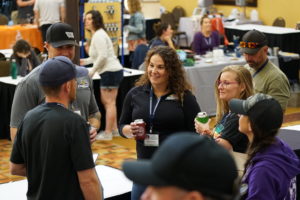 In addition to educational presentations, panels, and workshops, the conference will also provide dedicated time each day to explore the spacious trade show and enjoy Montana made beer, as well as attend evening networking opportunities. Amongst the evening offerings will be a private, beer focused dinner hosted by MBA partner and Associate Member, Cambie Taphouse.
In addition to educational presentations, panels, and workshops, the conference will also provide dedicated time each day to explore the spacious trade show and enjoy Montana made beer, as well as attend evening networking opportunities. Amongst the evening offerings will be a private, beer focused dinner hosted by MBA partner and Associate Member, Cambie Taphouse.
Conference passes are on sale now; MBA Brewery Members and Associate Members receive discounted rates. To learn more or purchase your pass, visit montanabrewersconference.com
Interested in participating in the trade show or sponsorships? Contact [email protected] for details.
Thank you to our generous Fall sponsors:
TOUR SPONSORS
Big Sky Hops Farm
Gallatin Valley Malt
General Distributing Company
Propagate Lab
GOLD SPONSORS
Flathead Valley Hops
McDantim
Montana Wheat & Barley Committee
SILVER SPONSORS
ABS Commercial
BSG Craft
Montana Craft Beer Connection
Wipfli
BRONZE SPONSORS
G4 Kegs
Hopsteiner
SG Long Financial
On the heels of big victories at the World Beer Cup, Montana breweries continue to bring home accolades for our state.
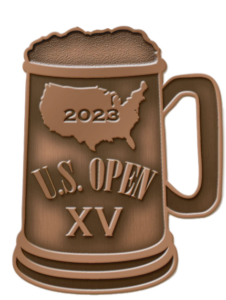 The US Open Beer Championship was held this May while winners were announced July 10. The competition touts that breweries from Maui to Miami submitted more than 9,000 beers representing over 170 different styles. The U.S. Open judges more beer styles than any other competition in the world.
The US Open Beer Championship was held this May while winners were announced July 10. The competition touts that breweries from Maui to Miami submitted more than 9,000 beers representing over 170 different styles. The U.S. Open judges more beer styles than any other competition in the world.
US Open winners included Cranky Sam Brewing (Missoula) who took home the Bronze in the English Summer Ale category for Tropical Blonde and another Bronze for their Hefeweizen Dunkel German Wheat.
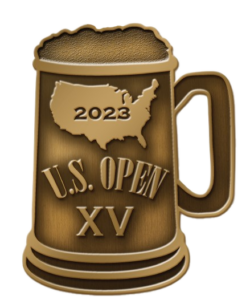 Old Bull Brewing (Frenchtown) clinched the Gold in Strong Scotch Ale for The Mrs. and received another Gold for Kind of a Big Dill in the Experimental Beer category.
Old Bull Brewing (Frenchtown) clinched the Gold in Strong Scotch Ale for The Mrs. and received another Gold for Kind of a Big Dill in the Experimental Beer category.
Then, the 26th International Beer and Cider Awards sanctioned by the North American Brewers Association wrapped up at the beginning of June. The competition provides an opportunity for products to be judged by qualified judges against the best beers, ciders, meads and sodas in the country.
Montana breweries made an excellent showing at the International Beer and Cider Awards with a variety of medals going home with brewers from across the state.
 Lewis and Clark Brewing (Helena) secured five awards with a Silver in the Bohemian-Style Pilsner category for Pompeys Pilsner, a Gold in American-Style Hefeweizen/Dark Hefeweizen for Miners Gold, a Gold in English-Style Pale Ale for Prickly Pear Pale Ale, a Gold in Scottish-Style Ale and a Bronze in Fruit Beers for their Huckleberry Hef.
Lewis and Clark Brewing (Helena) secured five awards with a Silver in the Bohemian-Style Pilsner category for Pompeys Pilsner, a Gold in American-Style Hefeweizen/Dark Hefeweizen for Miners Gold, a Gold in English-Style Pale Ale for Prickly Pear Pale Ale, a Gold in Scottish-Style Ale and a Bronze in Fruit Beers for their Huckleberry Hef.
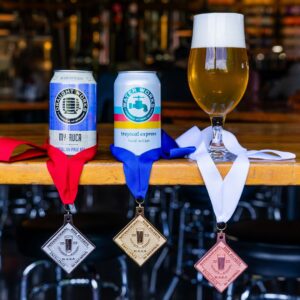 Draught Works Brewery (Missoula) was also a multiple medal winner with a Silver in the American-Style Pale Ale category for My Ruca, a Bronze in Vegetable, Pumpkin, or Field Beers for Pickle Power Sour, and a Gold in Low Carb/Low Calorie Hard Seltzers for Tropical Express.
Draught Works Brewery (Missoula) was also a multiple medal winner with a Silver in the American-Style Pale Ale category for My Ruca, a Bronze in Vegetable, Pumpkin, or Field Beers for Pickle Power Sour, and a Gold in Low Carb/Low Calorie Hard Seltzers for Tropical Express.
Red Lodge Ales (Red Lodge) picked up the Bronze for their Glacier Ale in the Altbier category while Copper Furrow Brewing (Helena) snagged the Bronze for their English Brown in the English-Style Brown Ale category.
Outlaw Brewing (Bozeman) won the Silver for The Capone in the Oatmeal Stout category and Thirsty Street Brewing Co.’s (Billings) Big Bison was the Bronze medal Foreign Style Stout.
Madison River Brewing Co. (Belgrade) and Cranky Sam Brewing (Missoula) each won a Gold medal for their Frostbite Barley Wine in the American-Style Barley Wine and Hefeweizen Dunkel in the Dunkelweizen/Weizen Bock categories respectively.
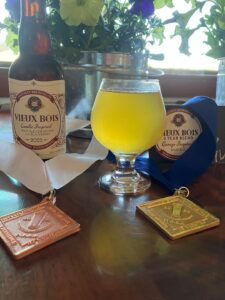 Carter’s Brewing (Billings) took home the Bronze for their Farmhouse Saison Locale in the Saison category while Bozeman Brewing won twice in the Lambic, Fruit Lambic and Gueuze Lambic category with a Gold for their Vieux Bois Gueuze Inspired Blend #3 and a Bronze for Vieux Bois Lambic Inspired w/ Blackberry.
Carter’s Brewing (Billings) took home the Bronze for their Farmhouse Saison Locale in the Saison category while Bozeman Brewing won twice in the Lambic, Fruit Lambic and Gueuze Lambic category with a Gold for their Vieux Bois Gueuze Inspired Blend #3 and a Bronze for Vieux Bois Lambic Inspired w/ Blackberry.
Finally, Blacksmith Brewing Company (Stevensville) took the Gold in Hop Water for their Hop Water beer.
All in all, Montana beer continually proves to be top notch as brewers from the Big Sky Country are recognized for excellence in brewing at the regional, national and international level.
Montana Brewers Association
P.O. Box 8591
Missoula, MT 59807
406-948-BREW (2739)